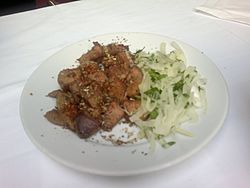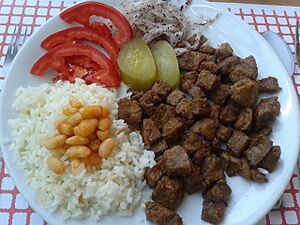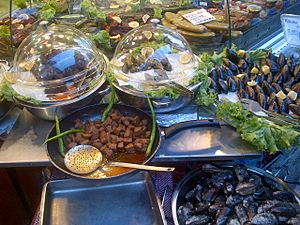Arnavut ciğeri facts for kids
 |
|
| Place of origin | Turkey |
|---|---|
| Region or state | İstanbul |
| Main ingredients | lamb or veal liver, oil, hot pepper, onion, parsley |
Arnavut ciğeri (say "Ar-na-voot jee-er-ee") is a tasty Turkish dish. Its name literally means "Albanian liver." This dish is made from small cubes of lamb or veal liver that are fried in oil. It's usually seasoned with hot pepper and traditionally served with fresh onion and parsley. It's a popular and flavorful part of Turkish cooking!
The name Arnavut ciğeri comes from the word Arnavut, which means "Albanian." So, the dish is known as "Albanian liver" in Istanbul cuisine.
How Did This Dish Originate?

The story of Arnavut ciğeri goes back to the 1400s. After wars in the area that became the Ottoman Balkans (also called Rumelia), many Albanians moved to the Istanbul region. These travelers from the Balkans brought their own food traditions to Ottoman Anatolia.
Some Albanians became mobile sellers of raw liver. By the late 1600s, an Ottoman traveler named Evliya Çelebi wrote about Albanians working as butchers in Istanbul. They came from places like Ohrid, Korçë, and Hurupişte (which is now Argos Orestiko). They sold cuts of lamb meat, including liver, heart, and kidneys.
The dish Arnavut ciğeri became a part of Turkish cuisine during the Ottoman period. This happened as the Ottomans learned about and blended cooking traditions from different cultures they met with their own food customs and ways of cooking.
See also
 In Spanish: Arnavut ciğeri para niños
In Spanish: Arnavut ciğeri para niños


